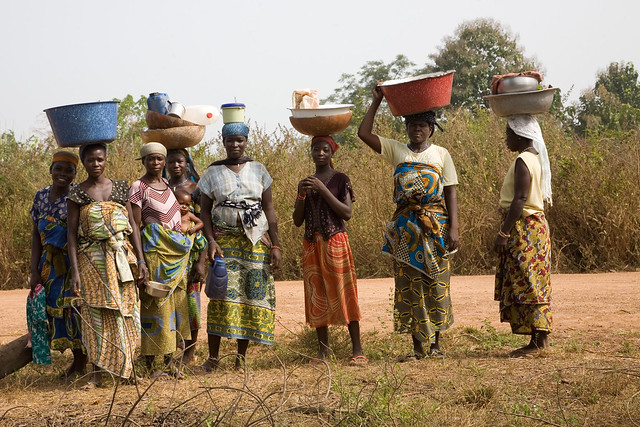

Researchers
In the northern region of Benin, in the Sudano-Sahel region of West Africa, the dry season between rains can last six to nine months at a time. Because most of Benin’s smallholder farmers rely on rain-fed agriculture for both their food supply and their income, the dry season can be a time not only of food insecurity but of poverty, illness and malnutrition. Groundwater is often too deep for traditional wells to reach, and the high price of fuel makes it difficult to rely on electric irrigation pumps.
Leveraging solar energy
In 2007, FSE joined with a US-based NGO, the Solar Electric Light Fund (SELF), which had just launched a project in Kalalé, Benin, to help electrify all 44 villages in the commune with solar power. Both the specific technologies involved and the project scale were unique, so SELF teamed up with the Center on Food Security and the Environment (FSE) to measure the impact of the project.
SELF helped the villages install solar arrays to power drip irrigation pumps, which farmers now use to grow high-valued crops in “solar market gardens.” This work expands on the African Market Garden project pioneered by the International Crops Research Institute for the Semi-Arid Tropics (ICRISAT).
The solar arrays, which are paid for by SELF and installed and maintained by villagers, use the sun’s energy to power water pumps that tap into deep wells. The pumps deliver water to plants through a system of rubber hoses with small perforations, so that water drips onto the roots of individual plants throughout the day, reducing water waste and improving plant growth. In the dry season these crops provide a steady food source, better nutrition, and higher household incomes as families sell extra produce at nearby markets.
Measuring impact
Working with a local women’s farming cooperative, FSE’s team led by FSE director Rosamond L. Naylor and FSE fellow Jennifer Burney designed a multi-year survey to measure the impacts of a small pilot subset of solar market gardens. How do the new irrigation systems affect a farming household’s food security, income, health and well-being during the dry season? We found that solar irrigation technology yields substantial and significant benefits in the form of higher household income and nutritional intake, and is cost-competitive in the medium term, especially where fuel supplies for other types of pumps are unreliable. (See "An Alternative Development Model: Assessing solar electrification for income generation in Benin.”)
Preliminary results of our ongoing study highlighted several key impacts of the solar market gardens:
- Food insecurity dropped 17 percent and nutrition security improved in households with access to the solar irrigation system
- Families with solar market gardens were able to spend an average of $0.69 more per day (per person), primarily on food and especially during the dry season
- Solar irrigation systems made it easier for all households, even those without solar market gardens, to meet their daily water needs
- Farmers with solar market gardens spent less time working on their plots and were much more likely to report that their overall family well-being had improved in the first year of the project
- Within a year, the village with the first pilot installation developed an elementary school curriculum to teach children about solar irrigation technology and high-value crop production
Looking ahead and scaling up
Ultimately we are optimistic about the potential for this technology to scale up, to improve regional and national food security and economic development in Benin, and beyond. In 2014 the project expanded to 8 new villages, and our surveys expanded to measure household health indicators in much more detail. A goal of this phase of scale up is to create a regional market and learning center for the technology, so that it can be replicated in other areas of West Africa. Our goal is to provide careful evaluation of the solar market garden system using a randomized, control-study approach at each phase of the scale up.
As the world struggles to cope with a changing climate, we hope that data from our work will help shape the debate on how best to promote environmentally-friendly development in the world’s poorest and most vulnerable nations. In our view, it is also critical that investments in this system pay off in the long run for external donors, farmer groups, and private farmers adopting the technology. We hope our research encourages these stakeholders to consider the "pay off" to include private profitability but also nutritional improvements, equity between and among households, marketing expansion, and educational impacts. These factors are all included in the scope of our study.

